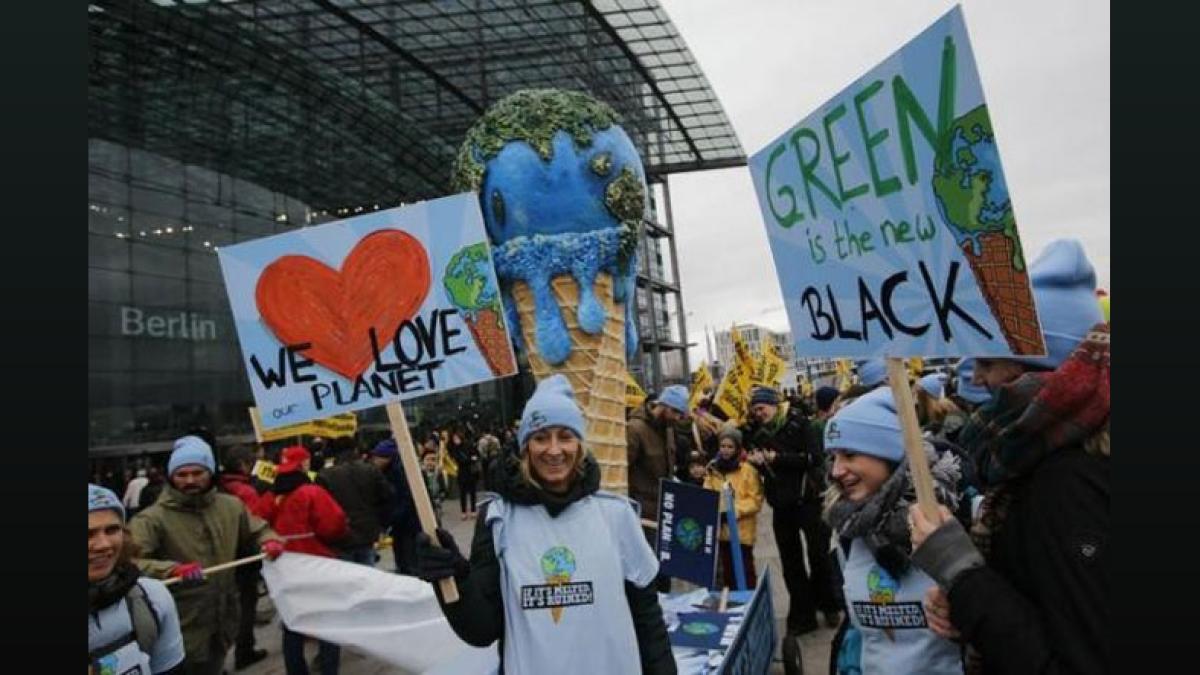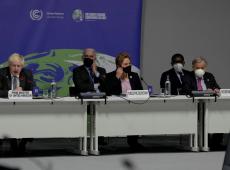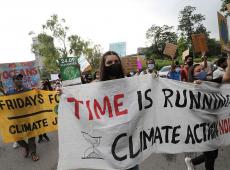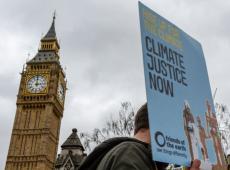India Demands USD 1.3 Trillion Climate Finance at COP29
By Gaurav Saini, New Delhi Nov 14, 2024 23:06
India, representing developing countries, calls for USD 1.3 trillion annual climate finance from developed nations until 2030, rejecting a 'global investment goal'.

New Delhi, Nov 14 (PTI) India on Thursday said developed countries must commit to providing at least USD 1.3 trillion each year until 2030 to developing nations and that the new climate finance package being negotiated at the UN climate conference in Azerbaijan cannot become an "investment goal".
Speaking on behalf of the Like-Minded Developing Countries (LMDC) at the sixth High-Level Dialogue on Climate Finance at COP29, India emphasised that this support for developing countries to cope with the warming world should come through grants, concessional financing and non-debt-incurring aid.
It said the new climate finance package or the New Collective Quantified Goal (NCQG) -- the top priority for this year's UN climate summit -- should align with the evolving priorities of developing countries and be free from restrictive conditions that could hinder their growth.
"Developed countries need to commit to providing and mobilising at least USD 1.3 trillion every year till 2030 through grants, concessional finance and non-debt-inducing support," the Indian negotiator, Naresh Pal Gangwar, said.
The official said this support is vital for advancing towards COP30 at Belem in Brazil, where all parties are expected to submit their updated Nationally Determined Contributions or national climate plans.
"Achieving this outcome will set a solid foundation for meaningful progress in our global climate efforts," Gangwar said.
India also said the "NCQG cannot be changed into an investment goal", when it is a unidirectional provision and mobilisation goal from developed to developing countries.
"The Paris Agreement is clear on who is to provide and mobilise climate finance -- it is the developed countries," it said.
India said bringing in elements of any new goal that is outside the mandate of the UN climate change convention and its Paris Agreement is "unacceptable".
"We do not see any scope for renegotiation of the Paris Agreement and its provisions," it said.
Developing countries argue that under the UN climate change convention and the Paris Agreement, it is the responsibility of developed nations to mobilise climate finance for them.
However, developed countries are pushing for a "global investment goal" that would draw funding from a variety of sources, including governments, private companies and investors.
Harjeet Singh, climate activist and global engagement director for the Fossil Fuel Non-Proliferation Treaty Initiative, said turning climate finance into an "investment goal" is a betrayal of trust for those bearing the brunt of climate impacts.
"India and other developing nations are clear -- they need the commitment of trillions annually through grants and non-debt-inducing support, not investment schemes that let wealthy nations profit from the crisis they played a large role in creating.
"Anything less is double injustice, heaping new financial burdens on those already struggling to transition away from fossil fuels and protect their communities. Developed countries have a responsibility under the Paris Agreement to deliver real, accountable climate finance -- redirecting this goal into a profit opportunity goes against both the letter and spirit of that obligation," Singh said.
Terming developed countries' performance on their financial and technological commitments "disappointing", India said the USD 100 billion target, promised in 2009, is already inadequate and has repeatedly been unmet.
It said there is no clarity on what developed countries are actually counting as climate finance.
"Transparency and trust are the backbone of any multilateral process.... A clear definition of climate finance, in line with the provisions of the UNFCCC and its Paris Agreement, will promote transparency and is vital for furthering constructive deliberations and building trust," India said.
At COP15 in 2009, developed countries pledged to mobilise USD 100 billion per year to help developing nations cope with climate change by 2020. However, this target was only met in 2022, with loans accounting for around 70 per cent of the total climate finance provided.
The NCQG is set to replace the USD 100 billion target next year.
Speaking on behalf of the Like-Minded Developing Countries (LMDC) at the sixth High-Level Dialogue on Climate Finance at COP29, India emphasised that this support for developing countries to cope with the warming world should come through grants, concessional financing and non-debt-incurring aid.
It said the new climate finance package or the New Collective Quantified Goal (NCQG) -- the top priority for this year's UN climate summit -- should align with the evolving priorities of developing countries and be free from restrictive conditions that could hinder their growth.
"Developed countries need to commit to providing and mobilising at least USD 1.3 trillion every year till 2030 through grants, concessional finance and non-debt-inducing support," the Indian negotiator, Naresh Pal Gangwar, said.
The official said this support is vital for advancing towards COP30 at Belem in Brazil, where all parties are expected to submit their updated Nationally Determined Contributions or national climate plans.
"Achieving this outcome will set a solid foundation for meaningful progress in our global climate efforts," Gangwar said.
India also said the "NCQG cannot be changed into an investment goal", when it is a unidirectional provision and mobilisation goal from developed to developing countries.
"The Paris Agreement is clear on who is to provide and mobilise climate finance -- it is the developed countries," it said.
India said bringing in elements of any new goal that is outside the mandate of the UN climate change convention and its Paris Agreement is "unacceptable".
"We do not see any scope for renegotiation of the Paris Agreement and its provisions," it said.
Developing countries argue that under the UN climate change convention and the Paris Agreement, it is the responsibility of developed nations to mobilise climate finance for them.
However, developed countries are pushing for a "global investment goal" that would draw funding from a variety of sources, including governments, private companies and investors.
Harjeet Singh, climate activist and global engagement director for the Fossil Fuel Non-Proliferation Treaty Initiative, said turning climate finance into an "investment goal" is a betrayal of trust for those bearing the brunt of climate impacts.
"India and other developing nations are clear -- they need the commitment of trillions annually through grants and non-debt-inducing support, not investment schemes that let wealthy nations profit from the crisis they played a large role in creating.
"Anything less is double injustice, heaping new financial burdens on those already struggling to transition away from fossil fuels and protect their communities. Developed countries have a responsibility under the Paris Agreement to deliver real, accountable climate finance -- redirecting this goal into a profit opportunity goes against both the letter and spirit of that obligation," Singh said.
Terming developed countries' performance on their financial and technological commitments "disappointing", India said the USD 100 billion target, promised in 2009, is already inadequate and has repeatedly been unmet.
It said there is no clarity on what developed countries are actually counting as climate finance.
"Transparency and trust are the backbone of any multilateral process.... A clear definition of climate finance, in line with the provisions of the UNFCCC and its Paris Agreement, will promote transparency and is vital for furthering constructive deliberations and building trust," India said.
At COP15 in 2009, developed countries pledged to mobilise USD 100 billion per year to help developing nations cope with climate change by 2020. However, this target was only met in 2022, with loans accounting for around 70 per cent of the total climate finance provided.
The NCQG is set to replace the USD 100 billion target next year.
Source: PTI
DISCLAIMER - This article is from a syndicated feed. The original source is responsible for accuracy, views & content ownership. Views expressed may not reflect those of rediff.com India Limited.
You May Like To Read
TODAY'S MOST TRADED COMPANIES
- Company Name
- Price
- Volume
- Vodafone Idea L
- 8.02 (+ 1.01)
- 43495805
- ARC Finance
- 1.43 (+ 4.38)
- 40030208
- Srestha Finvest
- 0.83 (+ 1.22)
- 27087953
- Guj. Toolroom Lt
- 17.22 (+ 5.00)
- 18236924
- G G Engineering
- 1.72 ( -2.27)
- 13257837
MORE NEWS

India to Expand Food Testing Infrastructure for...
India's Export Inspection Council (EIC) is expanding food testing infrastructure to...

Standard Glass IPO: Price Band at Rs 133-140,...
Standard Glass Lining Technology's IPO opens on January 6 with a price band of Rs...
Amit Shah Pushes Organic Farming: Quality...
Amit Shah directs National Cooperative Organic Ltd (NCOL) to strengthen quality control...








 © 2025 Rediff.com India Limited. All rights reserved.
© 2025 Rediff.com India Limited. All rights reserved.